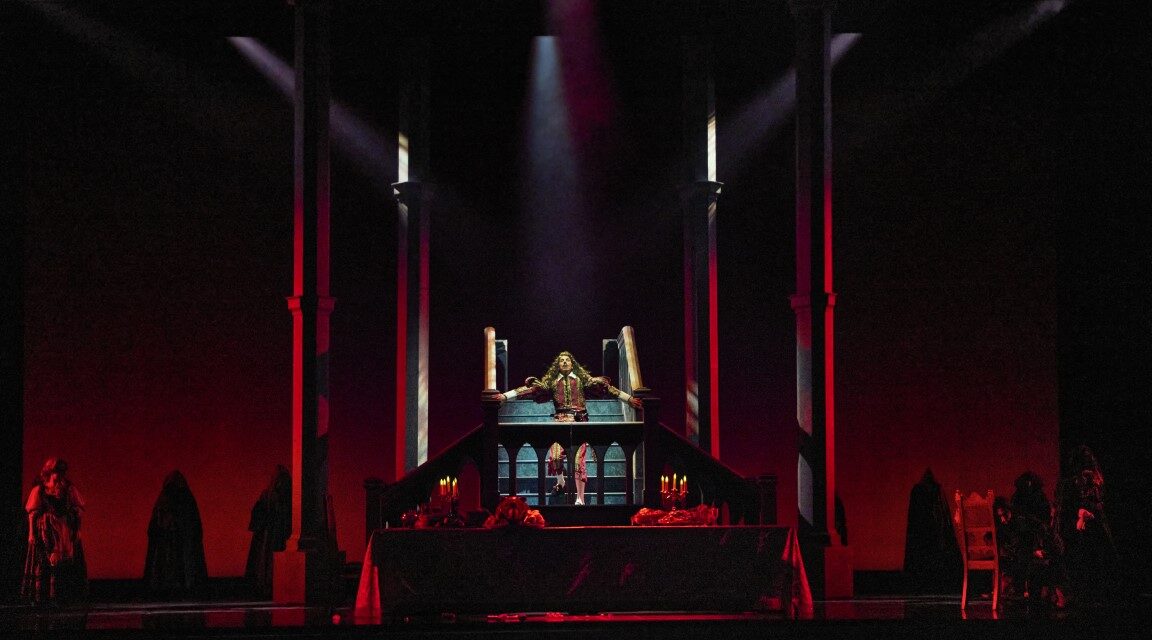Calgary Opera concentrates on what makes opera such a powerful art-form
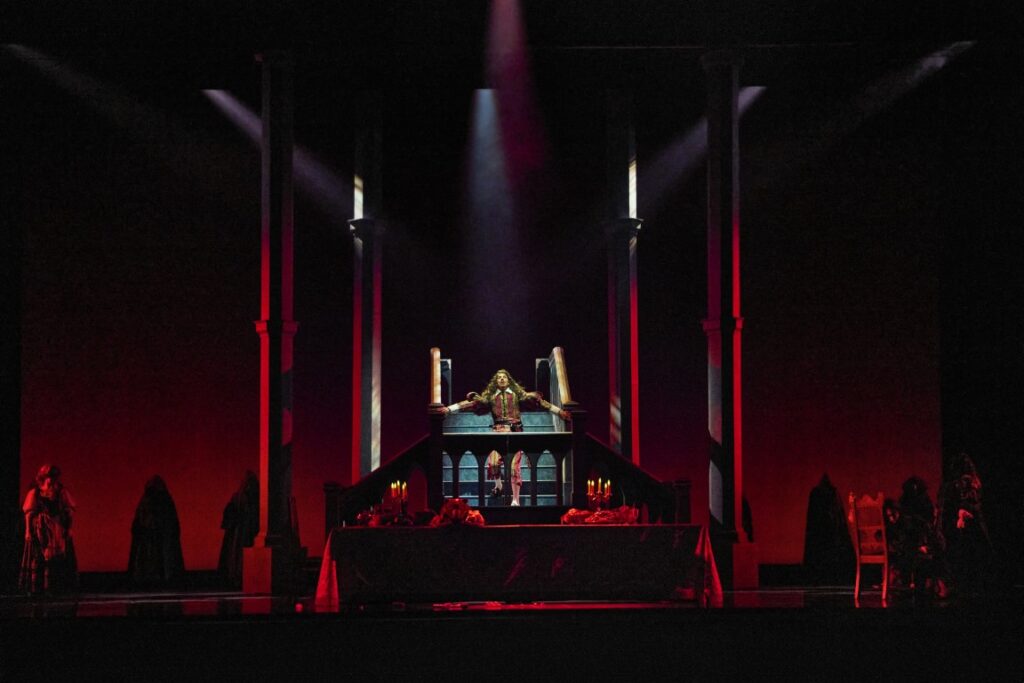
Review by Mark Morris
Photos by HarderLee Photography
Don Giovanni – Phillip Addis
Donna Anna – Midori Marsh
Donna Elvira – Aviva Fortunata
Leporello – Guido Loconsolo
Don Ottavio – Chuan Wang
Zerlina – Christina Thanisch-Smith
Masetto & Commendatore – Neil Craighead
The Calgary Opera Chorus
The Calgary Philharmonic Orchestra
Conductor – Jonathan Brandani
Stage Director – Anna Theodosakis
Set design – Scott Reid
Lighting design – David Fraser
Costume design – Howard Tsvi Kaplan
Southern Jubilee Auditorium, Calgary
Saturday, November 2, 2024
After Edmonton Opera’s forgettable rewriting of Mozart’s Don Giovanni in February, what a relief to drive down to Calgary on the first real day of winter, with snow flurries dusting the verges, and to be reminded how an essentially traditional production, imaginative and very well cast, can work really well (and pull in the audiences, judging from its first night on November 2).
In Calgary Opera’s new staging, the stark and simple set by Scott Reid uses eight pillars going from floor to the roof, an inventive movable staircase, a laden table for Don Giovanni’s feast, and that’s it. Those pillars glide in rather a ghostly manner around the stage, to reconfigure the scene, some of them occasionally going off completely. Their gliding inevitably, for anyone who knows the opera, foreshadows the Commendatore’s statue. Their design is inseparable from the lighting effects by David Fraser, creating a darkened miasma of reds and blacks, running rivulets up those columns, with the very occasional shaft of white. The sumptuous costumes by Howard Tsvi Kaplan (sourced from Sarasota Opera) provide the contrast of detail – think Three Musketeers, right down to the peasant costumes, reds and burgundies and browns predominating.
Dark red permeates everywhere – the red of blood, the traditional colour of wanton women, the red of the fires of hell. Indeed, the overall effect, dark – crepuscular, even – but never gloomy, creates a sense of ritual space, as if the whole thing was being played out in Seville Cathedral. The Commendatore’s statue adds to this ritual effect – it is a bust on a short column, as might well be found in an alcove in that cathedral. Indeed, I was vividly reminded of the opening of Matthew Lewis’ classic gothic novel, The Monk, written eight years after the opera, where two Giovanni-like rakes eye up the women in a crowded Madrid church service (the Calgary Opera program note incorrectly gives the opera’s first performance date as 1797 – it was actually premiered in 1787).
Anna Theodosakis’s staging makes the most of this scenario to concentrate on the drama, and to keep the pace going. Indeed, one of the real virtues of this production is how well all the elements of the opera performance melded together, and another is how Theodosakis has managed to make what can sometimes seem a complicated plot clear and straightforward.
The program booklet suggests that the intent is to bring out the injustices done to the women and their resistance, citing figures of contemporary abuse of women in Canada. In actuality, in this production the opera does that perfectly successfully without any need of directorial overprint, apart from giving full reign to the musical opportunities for the women in the cast. The one time there is such a directorial intercession – when Don Giovanni pushes Donna Elvira onto the table at the end and rapes her – while decidedly shocking, also feels out-of-place, as it is so clearly added, rather like editorializing in a news story. The opera, surely, speaks for itself in how badly the title character treats the women.
It was the women, therefore, who dominated vocally in this production, in part because both the Italian bass-baritone Guido Loconsolo as Leporello and Phillip Addis as Don Giovanni were cast with lighter, more lyrical voices than is sometimes the case. Both have considerable international experience (Loconsolo has sung the role at the Bolshoi), and it showed. Addis’ stage presence grew stronger as the evening progressed.
But it was the women who displayed more complexity of character. Canadian-Italian soprano Aviva Fortunata, a former Donna Anna at Pacific Opera, turned Donna Elvira into less of the rejected bitter person she is sometimes portrayed as, and more of a forthright and very annoyed woman determined to assert her agency, not without a leavening of humour. She knows how to make the most of recitatives, and there were some revealing little acting moments, such as tearing a page out of the catalogue book (presumably hers), and a “I-told-you-so” look back at Don Giovanni as she leads Zerlina away.
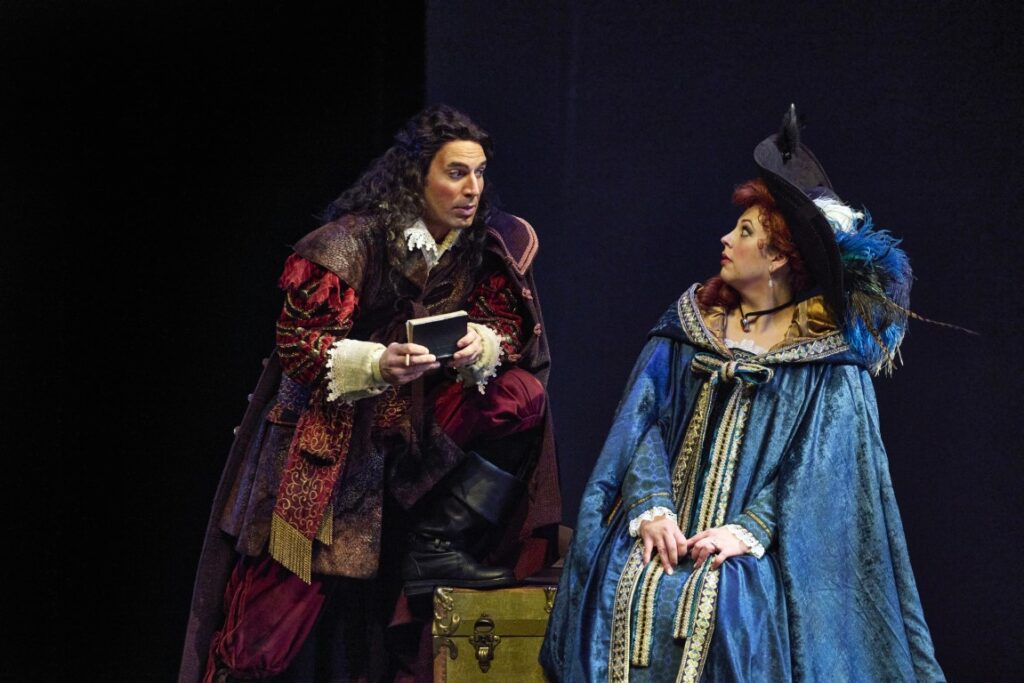
The young Winnipeg-raised soprano Christina Thanisch-Smith, making her company debut, provided (as so often with this character) a complete contrast as Zerlina. She was coquettish, clearly far more aware (and one assumed more experienced) than might be wholly proper in one about to marry Masetto (an effectively gruff Neil Craighead, who also played the Commendatore), and with the kind of sparkling soprano required for such a portrayal. It was a touch stereotypical (the young lively peasant maid), but it made sense in the overall approach that highlighted strong and self-willed women. She did, though, seem little uncertain whether to suggest erotic undertones in the problematic aria ‘Batti, batti, o bel Masetto’, and perhaps missed a chance here.
She also made an effective use of playing to the audience, a feature used throughout the production. It was a valid approach (after all, in the libretto Don Giovanni talks directly to the musicians at the banquet). But it could perhaps have been used more consistently, especially in Act 1, for when used well it effectively broke down the fourth wall.
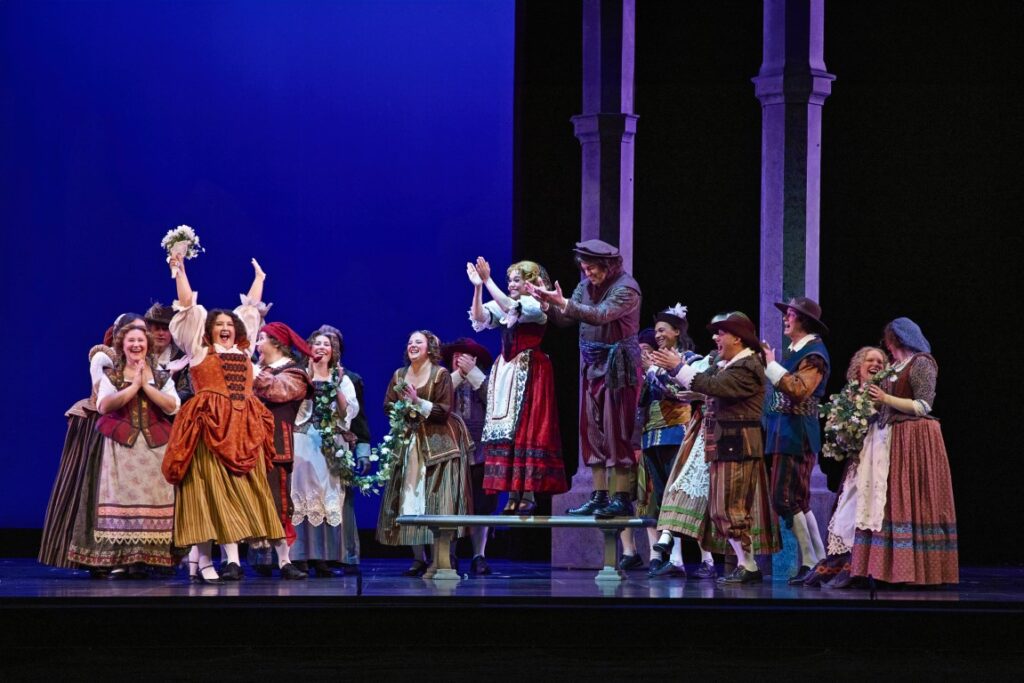
The outstanding performance, however, came from a young newcomer of real promise, currently a powerful bel-canto soprano, though one wonders whether she might have the potential of developing into that rarest of singers, a genuine dramatic soprano. Midori Marsh is an American-Canadian singer, a Canadian Opera Company young artist who studied in Toronto, and who was here making her Calgary Opera debut, and her debut in the role of Donna Anna. She started a little hesitantly in reacting to the death of her father, but once she had shed the virginal white costume for browns and russets, it was clear that here was something exceptional, portraying the role with an intensity of emotion that dominated the stage. It is a powerful, darkly rounded, and flexible voice, bright when needed, happily cutting through all, with a tender and appealing high range. What was so impressive was her dramatic sense, less in her stage acting (though that was strong), but more in her vocal acting, varying the sound and the emotion so effortlessly and so effectively, especially for one so inexperienced. Here is a young singer to watch.
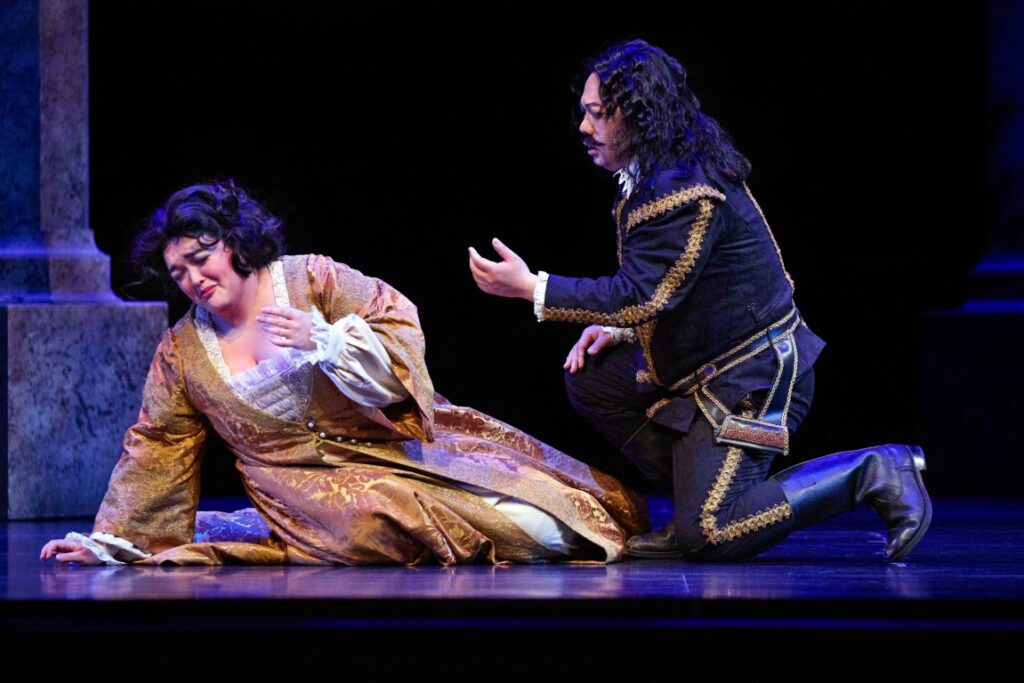
In the pit, things were as what now seems to be the norm in the two Alberta opera houses: efficient conducting from Jonathan Brandani, efficient playing from the Calgary Philharmonic, all of which supported the singers with generally well-judged tempi. But it was so bland: conductors in the Province seem afraid of realizing that they have a wonderful protagonist in the pit, not just an accompanist (and the Calgary Philharmonic is perfectly capable of more verve and zest and nuance and colour). A single example will suffice: when Don Giovanni, sitting at the dinner table in Act 2, Scene XIII, calls out for music, Mozart gives the brass flamboyant fanfares, setting up the mood. Here their response was, well, bland, and there was no sense of them interacting with Giovanni’s commands when they answer with two sets of two measures.
It did not matter – but it was the one element of an enjoyable and thoughtful production that, while working perfectly well, had the potential to go further, to take a few more risks.
And it was a very satisfying evening, one where its three-hour length flew by – the real sign of a production that understood how a relatively traditional presentation can bring out the best virtues of opera itself.

